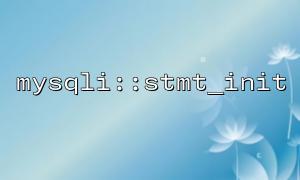When using PHP's mysqli extension for database operations, prepare() is a key step, especially in scenarios where preprocessing statements are used to improve security and performance. However, some developers will encounter a confusing problem: SQL statements are spelled completely correctly, but they still report an error when calling prepare() . This article will combine the mysqli::stmt_init function to explore the common causes and troubleshooting methods of this problem.
$mysqli = new mysqli("localhost", "user", "password", "database");
if ($mysqli->connect_error) {
die("Connection failed: " . $mysqli->connect_error);
}
$stmt = $mysqli->stmt_init();
$sql = "SELECT * FROM users WHERE id = ?";
if (!$stmt->prepare($sql)) {
die("Preprocessing failed: " . $stmt->error);
}
Even if SQL syntax is correct, the above prepare() sometimes returns false and triggers an error message. Below we analyze the possible reasons item by item.
Although SQL statements are syntactically correct, prepare() fails in some MySQL versions if a table or column that does not exist in the database is referenced. for example:
SELECT * FROM userz WHERE id = ?
If the userz table does not exist, prepare() will still report an error even if the syntax is correct.
Solution: Check whether the table name and field name in SQL actually exist in the database.
MySQL users may not have the permissions required to execute certain statements, such as SELECT , INSERT , etc. Although the syntax is fine, insufficient permissions will cause prepare() to fail.
Solution: Ensure that the database user has corresponding operation permissions for the target table.
If the statement refers to a view, and the logic in that view has problems or depends on objects with limited permissions, it can also cause prepare() errors.
Solution: Check the involved views or triggers to make sure that their logic and permissions are correct.
After initializing the statement object with $mysqli->stmt_init() , the database connection may have expired, but still attempts to execute prepare() .
Solution: Use $mysqli->ping() to check whether the connection is still valid and reconnect if necessary.
MySQL prepare() does not support strings containing multiple statements, such as:
$sql = "SELECT * FROM users WHERE id = ?; DROP TABLE users;";
Although syntax is allowed in SQL, prepare() only accepts a single statement.
Workaround: Make sure that only one statement is included in the SQL string.
To debug this problem, in addition to viewing $stmt->error , you can also view $mysqli->error or enable exception mode for more detailed error information:
mysqli_report(MYSQLI_REPORT_ERROR | MYSQLI_REPORT_STRICT);
This will throw an error as an exception and helps in debugging.
Avoid hard-coded table and column names, and try to use constants or ORMs.
Avoid direct construction of SQL strings based on external input, preventing injection and semantic errors.
Turn on SQL logs in the deployment environment to help track execution details.
Related Tags:
SQL














